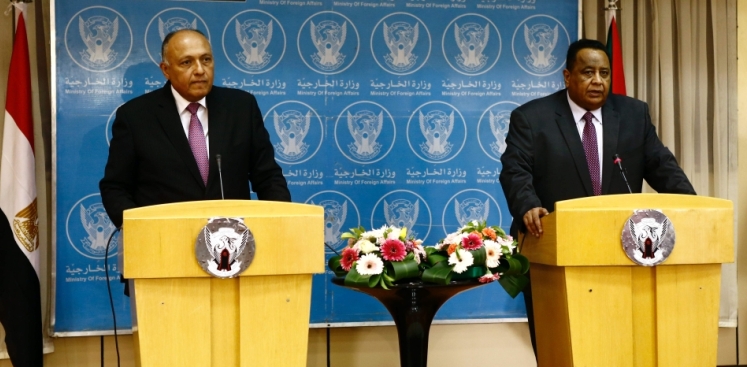Egypt refutes claims of using Sudan’s water quota

November 22, 2017 (KHARTOUM) – Egyptian Foreign Minister, Sameh Shoukry, Wednesday dismissed statements by his Sudanese counterpart Ibrahim Ghandour about Egypt’s use of Sudan quota of the Nile river water saying they only relieved the southern neighbour of unused share.
Last Tuesday Ghandour expressed his support to the Grand Ethiopian Renaissance Dam (GERD) saying it would enable Sudan to use its full share of the Nile water. He further pointed that Sudan has the right at any time to stop this “lend” adding that Egypt which he described as the “debtor” does not want this to happen.
The Sudanese minister was commenting on the failure of a meeting between the three water ministers held in Cairo to discuss a study on the impacts of the Ethiopian dam on Egypt. Sudan believes that the study is inaccurate because it attributes a part of its quota to the northern neighbour.
In line with a bilateral agreement between Egypt and Sudan after the construction of the High Aswan Dam in 1959, Egypt has the right to 55.5 billion cubic meters of Nile water a year while Sudan keeps 18.5 billion cubic meters.
“What Egypt used of Sudan’s quota of water in the past, was a surplus of its absorptive capacity, and with its consent. But it was not an advance or loan,” Shoukry said in statements to the official Middle East News Agency (MENA).
Shukri described Ghandour’s statements as “inaccurate,” adding he was surprised by his approach of “creditor and debtor in the water relations between the two countries”. He went further to say “it not appropriate to be used when it comes to natural resources”.
Further, the Egyptian top diplomat indicated that “Sudan has been using its entire share of Nile water, estimated at 18.5 billion cubic meters per year since a long time”.
“In previous years, Sudan’s absorptive capacity for is quota was incomplete. Therefore, the overflowing part of its share went to Egypt without its will and with the consent of Sudan,” he stressed.
In his remarks, Ghandour spoke about supplemental deals to the 1959 agreement allowing Egypt to benefit from the Sudanese quota.
When the conflict over the GERD construction erupted between Egypt and Ethiopia, Sudan sought to mediate between the two countries. But gradually, the outstanding disputes between Khartoum and Cairo over Halayeb triangle pushed the Sudanese government to stand with the project which will benefit to Sudan allow the full use of its share.
After his return from Cairo, last week, Sudanese water resources minister questioned the credibility of the study alluding it ignored Sudan’s share of the Nile water as it is provided in the 1959 agreement.
The dam issue is expected to top the agenda of Egyptian Ethiopian meetings on bilateral relations next December. The Ethiopian Prime Minister Hailemariam Desalegn will head his country’s delegation.
(ST)
